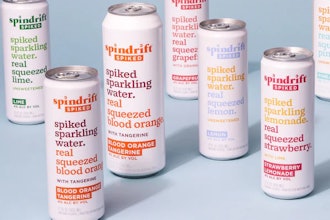CHICAGO, Aug. 30, 2018 (PRNewswire) — While popcorn has traditionally benefited from a health halo, new research from Mintel reveals that Americans are now embracing flavor innovation, from indulgent to savory, driven by the increasingly popular ready-to-eat (RTE) popcorn category. Total US retail sales of popcorn increased 32 percent in the last five years to reach an estimated $2.5 billion in 2017, with RTE popcorn leading the flavor innovation wave, growing an impressive 118 percent between 2012-17 to reach $1.1 billion.
With the pre-popped convenience of RTE popcorn offering a perfect medium for a range of flavors and toppings, consumers today are interested in flavor innovation — both familiar and unexpected — in the popcorn category. While traditional varieties like cheese-flavored (49%) and indulgent (i.e.chocolate/caramel covered) (32%) are high on the list, popcorn buyers* are also interested in purchasing options that are mixed flavor (eg salty, indulgent and cheesy popcorn in one bag) (39%), have additions mixed in (eg dried cranberries or candy) (20%) and are seasonal flavored (eg pumpkin spice, gingerbread) (12%).
Overall, while Americans are interested in indulgent flavors and mix-ins when it comes to popcorn, natural options have their place in the grocery cart as nearly half (45%) of popcorn consumers are interested in buying all-natural varieties.
"Popcorn sales have been on the rise in recent years and now the category is shifting from traditional flavors toward more dynamic flavors and combinations, driven by the ready-to-eat (RTE) segment which has seen sales more than double since 2012. RTE popcorn brands are finding success not only through an expanding array of creative new flavors, but also by tapping into growing interest in healthy, natural and portable snacks and eating occasions. The popcorn segment, and RTE popcorn in particular, is likely to continue benefiting from a generally healthy image as well as its suitability as a medium for a wide range of flavors and toppings. As such, there is an opportunity for brands in other salty snack segments to innovate with unexpected flavors to engage consumers, especially among younger generations who, our research shows, are looking for variety in the salty snack aisle," said John Owen, Senior Food and Drink Analyst at Mintel.
Meat Snacks Corner Salty Snacks Market
Meat snacks is the largest segment of the salty snacks category (30% market share), and also the fastest growing**, with sales increasing 45 percent in the last five years to reach $3.6 billion in 2017. While interest in premium products such as meat snacks made from prime cuts (58%) is high among meat snack consumers*** of all ages, younger consumers aged 18-34 are most likely to be interested in portable options such as meat snack bars (45% vs 38% overall).
"While the inherent benefits of protein and portability favor all meat snack brands, we're seeing some of the smaller brands drawing a point of distinction by offering niche flavors and formats. Our research shows that young salty snack purchasers place extra value on the portability of meat snacks, as well as its versatility to be eaten beyond snacking occasions. There is an opportunity for brands to position meat snacks for breakfast, where protein and portability have become essential attributes," continued Owen.
Are Americans In Denial About Salty Snacking?
The popularity of snacking is undeniable, but salty snack consumers**** are more likely to say they're eating less (19%) salty snacks today (compared to last year) than they are to say they're eating more (16%). While they're seen as an acceptable indulgence, with two in five (42%) agreeing that taste is more important than health when it comes to salty snacks, many are on the lookout for more healthful varieties as nearly half (48%) wish there were more healthy snack options.
While consumers may report eating less salty snacks, the variety of snacking occasions, such as munching while on-the-go (41%) and as an energy boost (22%), has helped the salty snacks category see continued growth over the last year, with overall category sales increasing 5 percent to reach an estimated $11.9 billion in 2017. Looking at the past five years, sales have grown 31 percent since 2012, making salty snacks one of the best performing major packaged food categories in recent years.
"The diverse salty snacks category benefits from the increasing prevalence of snacking and the blurring line between traditional meal times and snacking occasions. However, salty snack purchasers report eating less salty snacks, suggesting they aren't as willing to admit to their changing behavior, likely due to lingering negative perceptions of the category. Our research shows that because salty snacks are still primarily seen as an indulgence, there are opportunities for brands to shift their messaging and new product development to better position salty snacks as a healthy snacking option, such as popcorn, or more nutrient-dense, such as meat snacks, to continue the category's growth," concluded Owen.
*Base: 557 internet users aged 18+ who have purchased any popcorn in the three months leading to December 2017.
**Segments of the salty snacks category include meat snacks, popcorn, cheese snacks, pretzels, corn snacks and pork rinds.
***Base: 558 internet users aged 18+ who have purchased any meat snacks in the three months leading to December 2017.
****Base: 1,822 internet users aged 18+ who have purchased any salty snack type in the three months leading to December 2017.
About Mintel
Mintel is the world's leading market intelligence agency. For over 40 years, Mintel's expert analysis of the highest quality data and market research has directly impacted on client success. With offices in London, Chicago, Belfast, Kuala Lumpur, Mumbai, Munich, New York, São Paulo, Shanghai, Singapore, Sydney, Tokyo and Toronto, Mintel has forged a unique reputation as a world-renowned business brand. For more information on Mintel, please visit www.mintel.com.






















